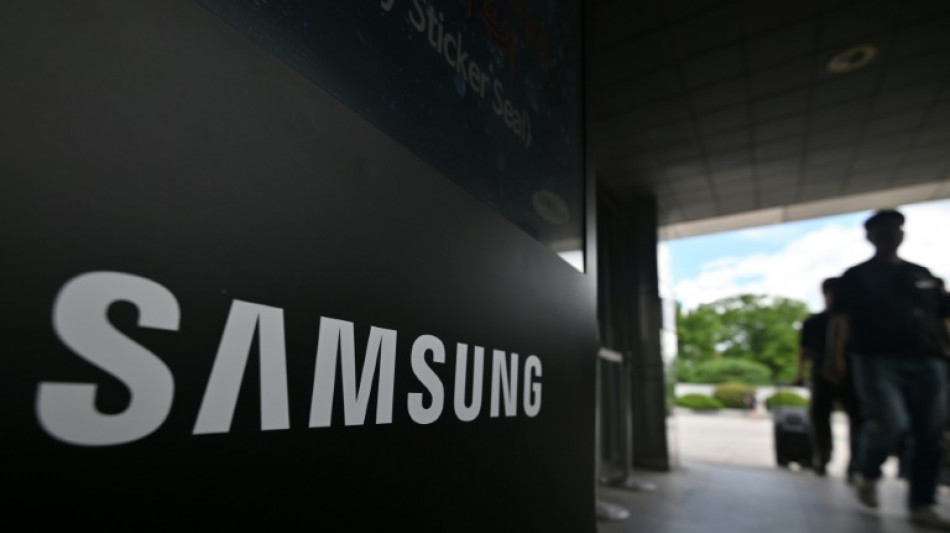
RBGPF
-0.0500


Samsung Electronics said Friday its operating profits surged 129.85 percent year-on-year in the fourth quarter of 2024, but fell from the previous quarter as it struggled to meet demand for chips used in artificial intelligence servers.
The company is the flagship subsidiary of South Korean giant Samsung Group, by far the largest of the family-controlled conglomerates that dominate Asia's fourth-largest economy.
The announcement comes after the world's largest memory-chip maker acknowledged in October it was facing a "crisis" and that questions had arisen about its "fundamental technological competitiveness and the future of the company".
Operating profit from the October to December period was 6.5 trillion won ($4.5 billion), up from 2.82 trillion won a year earlier, Samsung said in a regulatory filing.
Sales rose 11.8 percent to 75.78 trillion won, while net income of 7.75 trillion won was up 22.2 percent from a year earlier.
Net profit exceeded market expectations, according to the Yonhap News Agency, which cited its own financial data firm.
But the company's Q4 operating profit was lower than that of the previous quarter, which stood at 9.18 trillion won.
Samsung said Friday this was due to "soft market conditions especially for IT products, and an increase in expenditures including R&D."
"In the first quarter of 2025... overall earnings improvement may be limited due to weakness in the semiconductors business," it said.
US tech giant Nvidia, whose semiconductors power the AI industry, has been relying on SK hynix, Samsung's South Korean rival, as its main supplier of high-bandwidth memory (HBM) chips for its artificial intelligence graphics processing units (GPUs).
Samsung has been seen as struggling to meet Nvidia's requirements.
Its technology leadership "in the semiconductor market has been eroded over the last few years", Gloria Tsuen, a Moody's Ratings vice president and senior credit officer, told AFP.
"The rapidly increasing demand for AI chips also heightens the technological difficulty in developing new, custom-made chips for customers in a timely manner," she added.
Neil Shah of Counterpoint Research said the company's "conservative" moves to focus on costs relative to more challenging customer demands have been "key factors for the headwinds".
"Samsung lost first wave of semiconductor AI boom cycle to rivals SK hynix with HBM in AI servers and now is being challenged by Micron for DRAM in AI smartphones and PCs, especially in its own latest Galaxy S25 series flagships," he said.
But Bloomberg on Friday reported Samsung has obtained approval to supply a "version of its fifth-generation high-bandwidth memory chips" to Nvidia, citing people familiar with the matter.
- Blessing in disguise? -
China's startup DeepSeek recently unveiled its R1 chatbot that has apparently shown the ability to match the capacity of US AI pace-setters for a fraction of the investments made by American companies.
The Chinese startup has said it used less-advanced H800 chips -- permitted for export to China until late 2023 -- to power its large learning model.
The news hammered tech firms Monday, with Nvidia collapsing almost 17 percent and wiping almost $600 billion from its market capitalisation -- a record single-day loss for a publicly traded company.
Tuesday saw a tech rebound, with Nvidia surging 8.8 percent, but DeepSeek's arrival has still raised questions about whether the vast sums invested in AI in the past few years have been overdone.
"While Samsung faces fundamental technology headwinds, DeepSeek's claims have challenged the fundamental economics and investments for ongoing AI waves," Counterpoint's Shah said.
"This 'frugal innovation' could potentially slow down or stretch the hundreds of billions of dollars in AI infrastructure investments over the years," he said.
"So, this could be a 'blessing in disguise' for Samsung, allowing them to take the time needed to perfect their solution or to lower costs," he added.
Shares in Samsung were down 2.42 percent in early trade in Seoul.
B.Chan--ThChM